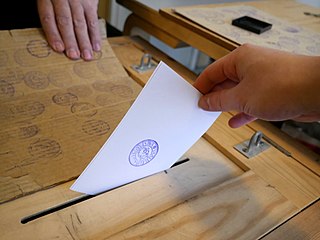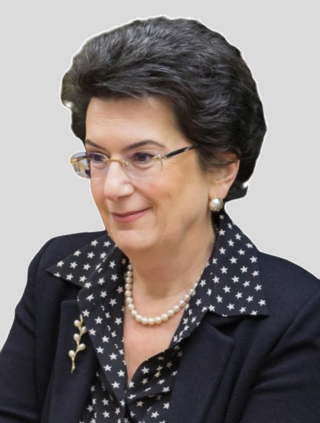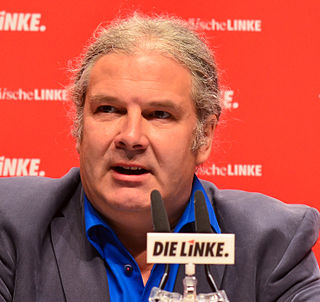
Politics in Georgia involve a parliamentary representative democratic republic with a multi-party system. The President of Georgia is the ceremonial head of state and the Prime Minister of Georgia is the head of government. The Prime Minister and the Government wield executive power. Legislative power is vested in both the Government and the unicameral Parliament of Georgia.

South Ossetia, officially the Republic of South Ossetia – the State of Alania, is a partially recognised landlocked state in the South Caucasus. It has an officially stated population of just over 56,500 people (2022), who live in an area of 3,900 square kilometres (1,500 sq mi), with 33,000 living in the capital city, Tskhinvali.

There are four types of elections in Finland. Each Finnish citizen at least 18 years of age has the right to vote in each of the elections, which decide the following: the president, the parliament, the MEPs, and the municipal and city councils.

Nino Burjanadze is a Georgian politician and lawyer who served as Chairperson of the Parliament of Georgia from November 2001 to June 2008. As the first woman she has served as the acting head of state of Georgia twice; the first time from 23 November 2003 to 25 January 2004 in the wake of Eduard Shevardnadze's resignation during the Rose Revolution, and again from 25 November 2007 to 20 January 2008, when Mikheil Saakashvili stepped down to rerun in the early presidential elections. She withdrew into opposition to Saakashvili as the leader of the Democratic Movement-United Georgia party in 2008. In October 2013, she ran in the presidential election, competing against 22 candidates. She ended third with 10 percent of the vote.

The president of Georgia is the ceremonial head of state of Georgia as well as the commander-in-chief of the Defense Forces. The constitution defines the presidential office as "the guarantor of the country’s unity and national independence."

Referendums in the United Kingdom are occasionally held at a national, regional or local level. Historically, national referendums are rare due to the long-standing principle of parliamentary sovereignty. There is no constitutional requirement to hold a national referendum for any purpose or on any issue however the UK Parliament is free to legislate through an Act of Parliament for a referendum to be held on any question at any time, but unless it is strictly legislated for these cannot be constitutionally binding on either the Government or Parliament, although they usually have a persuasive political effect.
Regular elections in Croatia are mandated by the Constitution and legislation enacted by Parliament. The presidency, Parliament, county prefects and assemblies, city and town mayors, and city and municipal councils are all elective offices. Since 1990, seven presidential elections have been held. During the same period, ten parliamentary elections were also held. In addition, there were nine nationwide local elections. Croatia has also held three elections to elect members of the European Parliament following its accession to the EU on 1 July 2013.

Malta elects on a national level 6 MEPs representing Malta in the European Parliament, on a district level the legislature, On a local level the Local Councils and on a community level the Administrative Committees.
This electoral calendar 2008 lists the national/federal direct elections held in 2008 in the de jure and de facto sovereign states and their dependent territories. Referendums are included, even though they are not elections. By-elections are not included.
Referendums in Ukraine, according to the Ukrainian Constitution, are one of the lawful forms of expression of people's will.

Georgia and the North Atlantic Treaty Organization (NATO) enjoy good relations. Georgia is not currently a member of NATO, but has been promised by NATO to be admitted in the future.

Parliamentary elections were held in Georgia on May 21, 2008. President Mikheil Saakashvili proposed a referendum on bringing them forward from October to April after the 2007 Georgian demonstrations. The referendum was held at the same time as the early presidential election on 5 January 2008; according to exit polls, voters were largely in favour of having the elections in spring.

Presidential elections were held in Georgia on 5 January 2008, moved forward from autumn 2008 by President Mikheil Saakashvili after the 2007 demonstrations.
Denmark holds opt-outs from European Union policies in relation to police and justice and the adoption of the euro. They were secured under the Edinburgh Agreement in 1992 after a referendum for the ratification of the Maastricht Treaty was rejected by Danish voters, as a package of measure to assuage concerns raised during that referendum.

This article describes the background of the Russo-Georgian War.

The accession of Montenegro to the North Atlantic Treaty Organization, or NATO, took place on 5 June 2017. In December 2009, Montenegro was granted a Membership Action Plan, the final step in an application for membership in the organization. A formal invitation was issued by the alliance on 2 December 2015, with accession negotiations concluded with the signature by the Foreign Ministers of an Accession Protocol on 19 May 2016. Montenegro officially joined NATO on 5 June 2017.
A referendum was held in Slovakia on 23 May and 24 May 1997. Voters in Slovakia were asked four separate questions: on whether the country should join NATO, whether nuclear weapons should be allowed in Slovakia, whether foreign military bases should be allowed in Slovakia, and whether the President should be elected directly. The government left the last question off the ballot paper, leading to both referendums failing to meet the legally required turnout threshold.

Andrej Konstantin Hunko is a German politician. He has been a member of the German Bundestag since 2009 and a member of the Parliamentary Assembly of the Council of Europe (PACE) since 2010. He has been deputy chairman of the Unified European Left parliamentary group since 2015 and deputy chairman of the Left parliamentary group in the Bundestag since 2020. He has been a member of the Executive Committee of the Left party since 2014.
A referendum is a direct vote in which an entire electorate is asked to either accept or reject a particular proposal. This article summarises referendum laws and practice in various countries.












